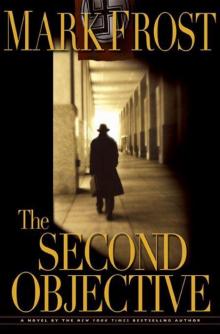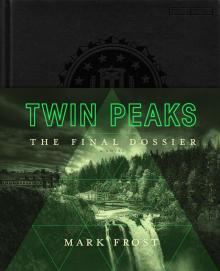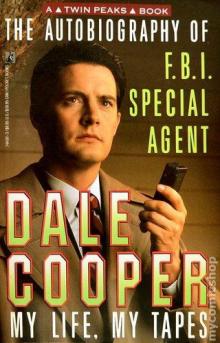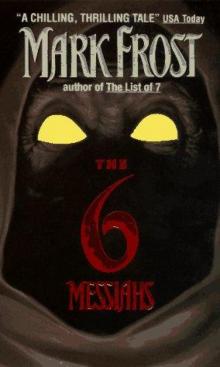- Home
- Mark Frost
The List of Seven Page 5
The List of Seven Read online
Page 5
As he walked out into the cool morning air, he found his terror and disorientation receding, and what quickly came to the fore was fury at the brutal slaying of Lady Nicholson and her brother. Her face would not leave his mind; her beseeching eyes, the cry as she fell. She sought my help, and I failed her in life; I will not do so now, he vowed.
Despite Sacker’s admonition, his first stop upon leaving the hospital that morning was Scotland Yard.
An hour later, Doyle was standing outside 13 Cheshire Street with Inspector Claude Leboux. The thin, grimy sunlight brought no rehabilitative cheer to the place but only accentuated its glum neutrality.
“You say they went in here, then?” Leboux asked.
Doyle nodded. He had spared the details from his friend to this point. The word murder had been employed, judiciously but effectively. He had produced Lady Nicholson’s note. No mention yet of spirits or gray hoods and blue thread. Or Professor Armond Sacker.
Leboux led the way up the steps and knocked. He was a solid Midlands ox of a man. A florid red handlebar mustache was the only decorative flourish he allowed himself, but its immaculately groomed and radiant plumage rendered any other such signatory moot.
Doyle had spent a year as ship’s physician with Leboux onboard a navy cutter, sailing to Morocco and ports south, during which their unlikely friendship had gradually germinated. Leboux was Royal Navy, fifteen years older, rudimentarily educated, a man of sufficient reticence to have his intelligence routinely questioned by the sharpies on board. But as Doyle discovered over the course of many card games and desultory conversations in the bow’s netting as they languished in tropical doldrums, Leboux’s diffidence shielded a sensitive heart and a character of unwavering morality. His mind seldom strayed from the parallel tracks of fact and truth—he prided himself on his lack of imagination. Those tracks took him straight from the navy to the London police and up the ranks in short order to his present position of inspector.
A small, fair Irishwoman Doyle had not seen before opened the door.
“’Elp you?”
“Scotland Yard, Miss. We’d like to have a look around.”
“Wot’s this about?”
Towering over her, Leboux leaned in and intoned, “Trouble, Miss.”
“I don’t live here, you know, I’m just visiting me Mum,” she said, backing away as they entered. “She’s upstairs, sick as a dog she is, ain’t left the bed in weeks. This ain’t to do with her, is it?”
“She’s a tenant, your Mum?” Leboux asked.
“That’s right—”
“Who lives down here, then?” Leboux asked, stopping at the right-hand door the weird boy had opened for Doyle the night before.
“Don’t know. Some foreign bloke, I think. Not here much. Neither am I, to be fair, only since Mum took ill.”
Doyle nodded to Leboux. “Foreign” was a fair enough description of the Dark Man, and Doyle had mentioned him to Leboux. Leboux knocked on the door.
“Know the name of this man, Miss?” he asked.
“No, sir, I surely don’t.”
“Were you here last night then?”
“No, sir. I was home. Down Cheapside.”
The queer glass bowl was gone from the table, Doyle noted. The pattern of splattered wax indicated someone had taken that candle and moved quickly. Leboux opened the door, and they entered the parlor.
“This as it was, Arthur?” Leboux asked.
“Yes,” Doyle replied. “The séance was through here.”
Doyle opened the sliding doors. The room as revealed appeared entirely different from the one in which he’d spent those dreadful minutes. Cramped with dusty, fussy furniture. No round table or hanging tapestries. Even the ceiling seemed lower.
“This isn’t right,” Doyle said, as he moved deeper into the room.
“Somethin’ happen to the fella who lives here, then?”
“You go on up and visit your Mum now. We’ll call if we need you,” Leboux said, closing the doors in the young woman’s face.
“They’ve replaced the furniture. The room was nearly empty.”
“Where was the violence done, Arthur?”
Doyle moved to the spot where the table had been sitting. A plump love seat now occupied the space where Lady Nicholson had fallen.
“Here,” he said, kneeling down. “There was no rug; the floor was bare.”
As he moved it aside, Doyle noticed the imprint of the love seat’s leg in the rug was deep and encrusted with dust. Leboux lent him a hand lifting the love seat away, then together they rolled back the carpet. The underlying floorboards were unstained and shiny with wear.
“It’s been cleaned, you see. The whole room, top to bottom. They’ve removed every trace,” Doyle said a bit frantic.
Leboux stood above him, stoic, noncommittal. Doyle bent to examine the floor more closely. He took a pipe-cleaning tool from his pocket and scraped at the joist between the slats: His efforts yielded a small portion of a dried dark matter. Doyle brushed the crumbs into an envelope and handed it to Leboux.
“I think you will find this substance is human blood. Lady Caroline Nicholson and her brother were murdered in this room last night. I recommend an immediate effort be made to alert their family.”
Leboux pocketed the envelope, took out a pad and paper, and dutifully wrote down the names. They proceeded to conduct a more detailed examination of the room. Nothing discovered led them to further understanding of the crimes committed or the identity of owner or occupant. Following the path through the nest of corridors that had led Doyle and Sacker to the alley proved equally fruitless.
As they stood in the alley looking back at the house, Doyle sketched in the details of the murderous engagement. He made no mention of Sacker, or his use of the pistol Leboux himself had given him months before. Leboux crossed his arms, stock-still, betraying no sentiment suggesting the relative credulity of what he heard. A good while passed before he responded. Doyle was accustomed to waiting out his friend’s epic silences: One could almost hear the tumblers of his mind clicking like slow hands on an abacus.
“You say this attack on the woman involved the use of a blade,” was Leboux’s first comment.
“Yes. A wicked-looking affair.”
Leboux nodded, and then with some new sense of purpose in his eyes, said, “You’d better come with me then.”
They walked three blocks to the vacant lot at the comer of Commercial and Aldgate. Police had sequestered the area. Bobbies manned the corners, directing away passersby. Leboux led Doyle through the cordon to the center of the lot where, that previous night, just as Doyle was arriving back at his rooms, the short, sorry life of the streetwalker known as Fairy Fay had come to a brutal and malicious end.
The rough canvas serving as her shroud was lifted. She was unclothed. The body had been eviscerated and the organs removed. Some were missing; the rest were neatly arranged outside of the body, in a pattern the significance of which was impossible to divine. The job had been quick, precise, and, as Doyle surmised from the absence of ripping at the entry points and edges of the wounds, executed with furiously honed instruments.
Doyle nodded. The canvas fluttered back over the corpse. Leboux trudged a few paces away. Doyle followed. Another Lebouxian silence ensued.
“Would that be Lady Nicholson then, Arthur?” he finally asked.
“No.”
“Was this woman at the séance last night?”
“No. I’ve never seen her before.”
With shock, Doyle realized that Leboux was probing for some weakness in his story. A policeman first and foremost, Doyle reminded himself, and the mood among the officers was grim and tight. Few, if any, had ever been exposed to the fruits of an act this savage and willful, certainly never in the routine of London police work.
“No one’s come forward?” he asked.
Leboux shook his head. “Prostitute most like. Now. Those blades you described, could they have done this work?”
; “Yes. Very possibly.”
Leboux blinked myopically. “Could you describe the assailants?”
“They wore hoods,” Doyle said, neglecting to mention that both killers had themselves been dispatched. Given that unholy facial stitching and the lack of blood from the mortal wounds they’d received, he didn’t feel Leboux was of a mind to consider the question, How do you kill something if it’s already dead?
Leboux of course sensed that Doyle was withholding key parts of his story, but was mindful enough of their friendship, and sufficiently convinced that Doyle had been through an authentically dire experience, to allow him to part company at this point. Watching Doyle walk away, Leboux felt daunted by the number of complications left to sort out. But after all, as he invariably said whenever confronted with a task of such complexity, that’s what time was for.
Upon first viewing the woman’s loathsomely mutilated corpse, one of the troubling thoughts he was still contending with had been, This is the work of a doctor.
chapter six
CAMBRIDGE
THE FIRST PREREQUISITE OF ELABORATE MENTAL EXERCISE was a full stomach. Doyle hadn’t eaten since his ordeal began the night before. He walked into the first crowded tavern he happened across, sat by the fire, and ordered a large breakfast, thankful that what little money he’d left in his rooms hadn’t fallen victim to the gelatinous infestation.
Afterward he pushed back his plate, lit a pipe, put his feet up, and felt the onset of that relaxed but heightened state of awareness wherein his mind hummed at maximum efficiency.
If, as Sacker had suggested, there was a conspiracy behind these events, it reasonably involved only a few individuals. Conspiracy requires secrecy. The greater number of people involved, human nature being what it was, the less likely secrecy became. The extent to which 13 Cheshire had been sanitized in those few short hours surely supported conspiracy. How to keep the requisite subordinates in line? Fear. Their ability to inspire it seemed beyond reproach. Black magicians? He was not personally acquainted with any, but that was no guarantee their numbers weren’t legion.
As to the manuscript…true, he’d contrived the villains’ identities himself—and a fair piece of invention it was, too, if he did say so—but as to their actual objectives, means, motives, and so forth, the damnable truth was he’d more or less cribbed the “Dark Brotherhood” from Blavatsky. Which begged the question, if they were after him because of his book, how close to the truth of what they were up to had that lunatic Russian wandered? And if she had that much right, what credence did that lend to the rest of her harebrained works?
The séance. More problematic. Perhaps. The levitation: wires and pulleys. The mirror could have been done with, well, with mirrors. The head of the beast a puppet of some kind, perhaps concealed in the bundle he’d seen that boy carry into the building. Conclusion: There could be logical explanations for the effects he’d witnessed, albeit of a more ingenious and sophisticated order than he’d encountered before.…
Wait just a moment—here he was perambulating around this garden of unearthly delights like a vicar on holiday. The fact remained there were bloodless blind men with Oriental daggers stalking about London trying to carve him like a Christmas goose. He had seen these things: fat women floating on air, heart-stopping black shadows, red-eyed creatures in phantom looking glasses, that poor wretch lying back there in the weeds. The brother as he fell, already lifeless. Lady Nicholson’s little boy, alone in that dark wood. The look on her face as the blade was drawn across.…
He shuddered, drew his coat more closely around his shoulders, and glanced around the room. No one was looking his way.
Yes, all right, I was already half in love with her, he admitted. Maybe they are after me, but what they’ve done to that poor woman and her family in springing the trap makes my blood boil, thought Doyle. They think they have me routed, on the run, well, revenge is a dish the Irish have been serving cold for countless generations. And whoever these godless devils might be, they are about to discover how severely they have underestimated this particular Irishman.
Sacker. The encounter in the cab, all the attendant shocks, there had hardly been time to summon a coherent question. Doyle took out Sacker’s calling card. He needed to confront the man while he had his wits about him. Cambridge was less than two hours by train. Tim, their driver, told him Lady Nicholson’s brother had been at university there, a possible connection. At last, an occasion to be grateful for his lack of success as a physician; there were no critically ill patients for whom his sudden absence would prove a hardship. He’d make for Liverpool Street Station, straightaway.
As he replaced the card in his bag, his eye caught the cover of the altered book. Isis Unveiled. He’d been in such a state he hadn’t even noticed. He lifted it, shielding its deformity from the rest of the room. Blavatsky: an appropriate companion for the journey he had embarked upon. Her photograph was still discernible through the rippling layer of…Good Christ. No, it couldn’t be. He looked closer. Yes.
The woman he’d seen with Petrovitch on the stairs of his building last night. It was her: Helena Petrovna Blavatsky!
The cab pulled up outside. He ran into the building.
“Mrs. Petrovitch!”
Dashing by his apartment, Doyle was told by a quick glance inside that nothing had changed since last night. He took the stairs three at a time to Petrovitch’s floor and knocked vigorously on her door.
“It’s Dr. Doyle, Mrs. Petrovitch!”
He noticed smoke seeping out from under the jamb.
“Mrs. Petrovitch!”
He threw a shoulder to the door, once, twice, stepped back, and with a heavy thrust kicked the door open.
Petrovitch lay on the floor, in the center of the room, unconscious. Smoke grew thick, but the room was not yet involved in flame; heavy brocaded curtains smoldered, lace curtains had already combusted.
Doyle ripped down the curtains, furiously beating back the fire so he could reach the fallen woman. He touched her and instantly knew she was dead. Redoubling his effort with the curtains, some anxious moments later he had the blaze dampened. Doyle closed the woman’s eyes and sat down to try to reconstruct what had happened.
Petrovitch’s dachshund wiggled out from under a sofa and nuzzled pathetically at its mistress’s ear.
Doyle studied the room: An open decanter of wine stood on a table, the stopper beside it, next to an open tin of digitalis pills and some drops of candle wax. A small crystal goblet lay on the floor near the body; trailing away from it, in the rug, a crimson stain. The table from where the candle had fallen lay between her and the window. The window was open.
She’d lit a candle. Felt a chest pain—she had heart trouble; that much he knew. She poured a glass of wine, opened the pill tin. The pain grew stronger, alarmingly so. Feeling claustrophobic, she opened the window to let in some air, and in doing so toppled the candle. When the curtains caught fire, she panicked. Her heart gave out. She fell.
Two objections. First, there was a fresh watermark on the table. The wineglass had been set down—it should have fallen toward the curtains, along with the candlestick. Second, there were a number of pills on the floor near the body. Even now, the little rat dog was gobbling one up off the rug. Perhaps she had dropped the tin and was in the process of replacing them when…no, there were no pills in her hand.
He examined the tin. Lint and other detritus were mixed in with the pellets themselves. So the pills had been spilled and then replaced—
At the sound of a whine and a cough, he turned in time to see Petrovitch’s dog keel over, spasm, and then lie still. Dead—better off, in a way, thought Doyle: It wasn’t a dog anyone else was likely to love—foam bubbling at the corner of its mouth. Poisoned.
So someone had poisoned Petrovitch and perhaps not surreptitiously. Doyle lifted her slightly; there were pills under the body as well. Livid bruises on either side of her jaw. She had struggled, knocking the tin away, scattering the pills. Her as
sailant forced the poison on her, then quickly tried to replace the pills in the tin before fleeing out the open window. Yes: There was a scuff mark on the windowsill. The candlestick knocked over during the struggle or perhaps more deliberately by the killer to obscure the deed. The body was still warm. The killer had left this room within the last ten minutes.
Another death to lay at his crowded doorstep. Poor Petrovitch. Impossible to imagine the woman could have herself inspired an enmity that would result in murder.
Careful not to touch the pills themselves, Doyle closed the tin and placed it in his bag and was at the door when he noticed a spot of white peeking out from behind a small mirror on the wall.
He pulled out a piece of paper and read:
DOCTOR DOYLE,
Urgent we speak. I am off to Cambridge. Petrovitch will tell you where to meet me. Trust no one. Nothing is as it seems.
HPB
Dated that morning. Blavatsky in Cambridge. The killer had stilled Petrovitch but missed this note. He left Petrovitch to heaven, with no doubt now as to his own destination.
Doyle detected no one following him to the station, nor was he aware of anyone watching him purchase his ticket or board the train. After he took a corner seat with an unobstructed view of the door, no one entered the car who took even passing notice of him.
As the train chugged away, Doyle scanned a stack of discarded tabloids, searching vainly for mention of Lady Nicholson’s disappearance. The engine’s tail of exhaust folded indistinguishably into the city’s morning mantle of soot and smoke. As he watched the street life flit by outside his window, Doyle’s envy for the plain uneventfulness of those ordinary lives gave way to an edgy excitement. However fraught with danger, a mission beckoned, and mission signified purpose, the lodestone of his internal compass. In spite of fatigue, his senses felt sharply attuned: the sweet pungency of the sandwich he’d bought for the journey, the agreeably warm froth of the bottled beer, the ripe mundungus of Moorish tobacco in the air.

 Rogue
Rogue The Second Objective
The Second Objective Alliance
Alliance Twin Peaks: The Final Dossier
Twin Peaks: The Final Dossier The Paladin Prophecy
The Paladin Prophecy Game Six: Cincinnati, Boston, and the 1975 World Series: The Triumph of America's Pastime
Game Six: Cincinnati, Boston, and the 1975 World Series: The Triumph of America's Pastime The List of Seven
The List of Seven The Autobiography of FBI Special Agent Dale Cooper
The Autobiography of FBI Special Agent Dale Cooper The Six Messiahs
The Six Messiahs The Secret History of Twin Peaks
The Secret History of Twin Peaks Paladin Prophecy 2: Alliance
Paladin Prophecy 2: Alliance Game Six
Game Six